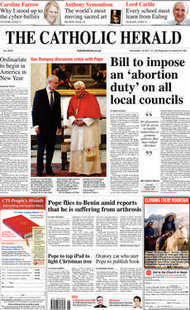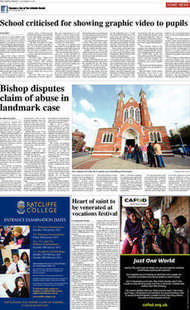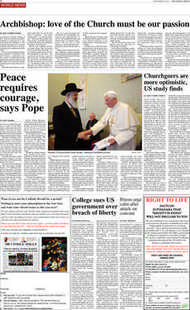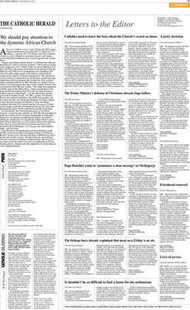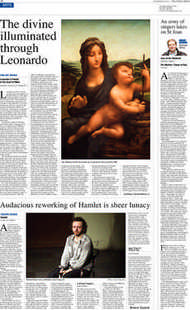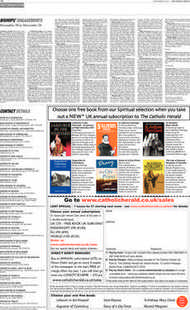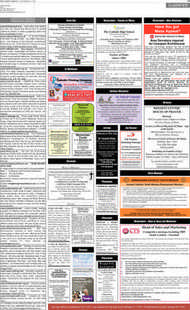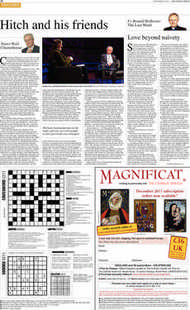Page 5, 18th November 2011
Page 5
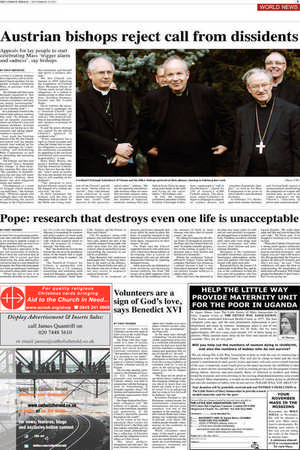
Report an error
Noticed an error on this page?If you've noticed an error in this article please click here to report it.
Tags
Share
Related articles
British Stem Cell Scientist Granted Private Audience With...
Immorality Of Stem Cell Science
Irish University In Embryology Row
Embryo Research Is Immoral, Say American Bishops
Pope Encourages Ethical Adult Stem Cell Research
Pope: research that destroys even one life is unacceptable
BY CINDY WOODEN
IN REJECTING research using embryonic stem cells the Catholic Church is not trying to impede science or delay treatment that can save lives, Pope Benedict XVI has said.
The Church’s opposition to the use and destruction of embryos flows from the conviction that all human life is sacred and that destroying the most defenceless will never lead to a true benefit for humanity, the Pope told participants in a Vatican-sponsored conference on research using adult stem cells.
“When the end in view is so eminently desirable as the discov ery of a cure for degenerative illnesses, it is tempting for scientists and policy-makers to brush aside ethical objections and to press ahead with whatever research seems to offer the prospect of a breakthrough,” the Pope said.
But, “the destruction of even one human life can never be justified in terms of the benefit that it might conceivably bring to another”, he said.
The Pontifical Council for Culture, in partnership with NeoStem Inc, a US company researching and marketing adult stem-cell therapies, sponsored the conference, entitled “Adult Stem Cells: Science and the Future of Man and Culture”.
The 30 speakers, along with patients who had been treated with stem cells, looked not only at the scientific progress being made with adult stem cells, but also at the cultural, ethical and political issues surrounding the research, its use and its availability.
Pope Benedict told conference participants that “in drawing attention to the needs of the defenceless, the Church thinks not only of the unborn, but also of those without easy access to expensive medical treatment”.
“Illness is no respecter of persons, and justice demands that every effort be made to place the fruits of scientific research at the disposal of all who stand to benefit from them, irrespective of their means,” he said.
The Pope said the Church supported research with adult stem cells, which have the possibility of developing into a variety of specialised cells and can alleviate degenerative illnesses by repairing damaged tissues.
Adult stem cells are obtained not from fertilising and destroying human embryos, but from “the tissues of an adult organism, from the blood of the umbilical cord at the moment of birth or from foetuses who have died of natural causes”, he said.
By calling for respect for the ethical limits of biomedical research, the Pope said, the Church does not seek “to impede scientific progress, but on the contrary to guide it in a direction that is truly fruitful and beneficial to humanity”.
Before the conference Vatican official Fr Tomasz Trafny said the company NeoStem was chosen as a partner because it had “a very clear ethical statement” that it would not destroy human embryos to obtain stem cells.
Stem cells have the potential to develop into many types of cells and are used primarily to regenerate damaged tissue or systems in the body. NeoStem executives said that adult stem cells were being used to treat leukaemia and other cancers, heart disease and autoimmune disorders.
Delegates at the conference included researchers, physicians, theologians, philosophers, politicians and patients who have been treated with adult stem cells.
Raymond Flynn, the former US ambassador to the Holy See, said he was at the conference to help his five-year-old grandson who has been diagnosed with a rare neuro logical disorder. “He walks three steps and falls and cuts his head. He can’t talk,” Mr Flynn said. “I’ve dropped everything to try to focus on him.
“When the Catholic Church took a strong stand against embryonic stem-cell research, it closed the door on one kind of research – and I agree, you can’t take a life to give life. But people think the Church is against all stem-cell research, and that’s not true,” he said. “This conference will open the door to understanding the possibilities of adult stem-cell research. Will it help people like Braeden? I don’t know. But I’m not giving up.”
blog comments powered by Disqus


